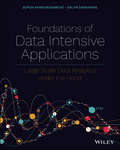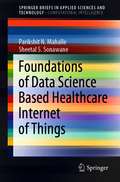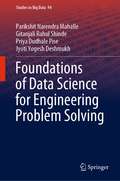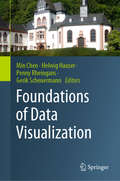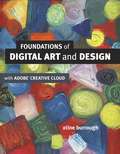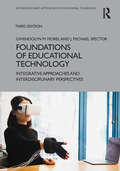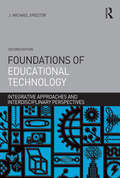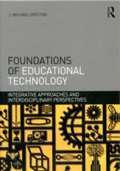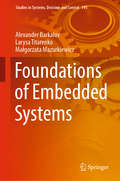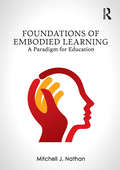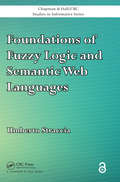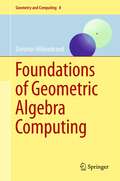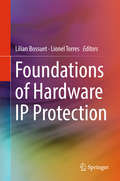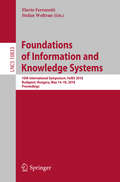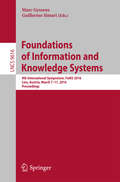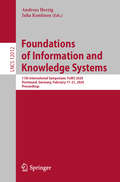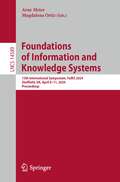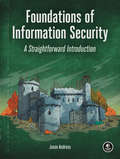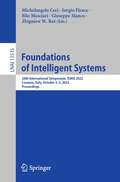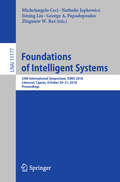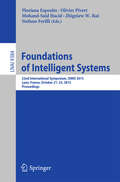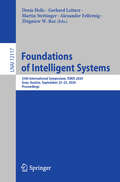- Table View
- List View
Foundations Of Data Exchange
by Marcelo ArenasThe problem of exchanging data between different databases with different schemas is an area of immense importance. Consequently data exchange has been one of the most active research topics in databases over the past decade. Foundational questions related to data exchange largely revolve around three key problems: how to build target solutions; how to answer queries over target solutions; and how to manipulate schema mappings themselves? The last question is also known under the name 'metadata management', since mappings represent metadata, rather than data in the database. In this book the authors summarize the key developments of a decade of research. Part I introduces the problem of data exchange via examples, both relational and XML; Part II deals with exchanging relational data; Part III focuses on exchanging XML data; and Part IV covers metadata management.
Foundations of Data Intensive Applications: Large Scale Data Analytics under the Hood
by Supun Kamburugamuve Saliya EkanayakePEEK “UNDER THE HOOD” OF BIG DATA ANALYTICS The world of big data analytics grows ever more complex. And while many people can work superficially with specific frameworks, far fewer understand the fundamental principles of large-scale, distributed data processing systems and how they operate. In Foundations of Data Intensive Applications: Large Scale Data Analytics under the Hood, renowned big-data experts and computer scientists Drs. Supun Kamburugamuve and Saliya Ekanayake deliver a practical guide to applying the principles of big data to software development for optimal performance. The authors discuss foundational components of large-scale data systems and walk readers through the major software design decisions that define performance, application type, and usability. You???ll learn how to recognize problems in your applications resulting in performance and distributed operation issues, diagnose them, and effectively eliminate them by relying on the bedrock big data principles explained within. Moving beyond individual frameworks and APIs for data processing, this book unlocks the theoretical ideas that operate under the hood of every big data processing system. Ideal for data scientists, data architects, dev-ops engineers, and developers, Foundations of Data Intensive Applications: Large Scale Data Analytics under the Hood shows readers how to: Identify the foundations of large-scale, distributed data processing systems Make major software design decisions that optimize performance Diagnose performance problems and distributed operation issues Understand state-of-the-art research in big data Explain and use the major big data frameworks and understand what underpins them Use big data analytics in the real world to solve practical problems
Foundations of Data Science
by Avrim Blum John Hopcroft Ravi KannanThis book provides an introduction to the mathematical and algorithmic foundations of data science, including machine learning, high-dimensional geometry, and analysis of large networks. Topics include the counterintuitive nature of data in high dimensions, important linear algebraic techniques such as singular value decomposition, the theory of random walks and Markov chains, the fundamentals of and important algorithms for machine learning, algorithms and analysis for clustering, probabilistic models for large networks, representation learning including topic modelling and non-negative matrix factorization, wavelets and compressed sensing. Important probabilistic techniques are developed including the law of large numbers, tail inequalities, analysis of random projections, generalization guarantees in machine learning, and moment methods for analysis of phase transitions in large random graphs. Additionally, important structural and complexity measures are discussed such as matrix norms and VC-dimension. This book is suitable for both undergraduate and graduate courses in the design and analysis of algorithms for data.
Foundations of Data Science Based Healthcare Internet of Things (SpringerBriefs in Applied Sciences and Technology)
by Parikshit N. Mahalle Sheetal S. SonawaneThis book offers a basic understanding of the Internet of Things (IoT), its design issues and challenges for healthcare applications. It also provides details of the challenges of healthcare big data, role of big data in healthcare and techniques, and tools for IoT in healthcare. This book offers a strong foundation to a beginner. All technical details that include healthcare data collection unit, technologies and tools used for the big data analytics implementation are explained in a clear and organized format.
Foundations of Data Science for Engineering Problem Solving (Studies in Big Data #94)
by Parikshit Narendra Mahalle Gitanjali Rahul Shinde Priya Dudhale Pise Jyoti Yogesh DeshmukhThis book is one-stop shop which offers essential information one must know and can implement in real-time business expansions to solve engineering problems in various disciplines. It will also help us to make future predictions and decisions using AI algorithms for engineering problems. Machine learning and optimizing techniques provide strong insights into novice users. In the era of big data, there is a need to deal with data science problems in multidisciplinary perspective. In the real world, data comes from various use cases, and there is a need of source specific data science models. Information is drawn from various platforms, channels, and sectors including web-based media, online business locales, medical services studies, and Internet. To understand the trends in the market, data science can take us through various scenarios. It takes help of artificial intelligence and machine learning techniques to design and optimize the algorithms. Big data modelling and visualization techniques of collected data play a vital role in the field of data science. This book targets the researchers from areas of artificial intelligence, machine learning, data science and big data analytics to look for new techniques in business analytics and applications of artificial intelligence in recent businesses.
Foundations of Data Visualization
by Min Chen Helwig Hauser Penny Rheingans Gerik ScheuermannThis is the first book that focuses entirely on the fundamental questions in visualization. Unlike other existing books in the field, it contains discussions that go far beyond individual visual representations and individual visualization algorithms. It offers a collection of investigative discourses that probe these questions from different perspectives, including concepts that help frame these questions and their potential answers, mathematical methods that underpin the scientific reasoning of these questions, empirical methods that facilitate the validation and falsification of potential answers, and case studies that stimulate hypotheses about potential answers while providing practical evidence for such hypotheses. Readers are not instructed to follow a specific theory, but their attention is brought to a broad range of schools of thoughts and different ways of investigating fundamental questions. As such, the book represents the by now most significant collective effort for gathering a large collection of discourses on the foundation of data visualization. Data visualization is a relatively young scientific discipline. Over the last three decades, a large collection of computer-supported visualization techniques have been developed, and the merits and benefits of using these techniques have been evidenced by numerous applications in practice. These technical advancements have given rise to the scientific curiosity about some fundamental questions such as why and how visualization works, when it is useful or effective and when it is not, what are the primary factors affecting its usefulness and effectiveness, and so on. This book signifies timely and exciting opportunities to answer such fundamental questions by building on the wealth of knowledge and experience accumulated in developing and deploying visualization technology in practice.
Foundations Of Digital Art And Design With The Adobe Creative Cloud
by Xtine BurroughAll students of digital design and production—whether learning in a classroom or on their own—need to understand the basic principles of design. These principles are often excluded from books that teach software. Foundations of Digital Art and Design reinvigorates software training by integrating design exercises into tutorials fusing design fundamentals and core Adobe Creative Cloud skills. The result is a comprehensive design learning experience. <p><p> This book is organized into six sections that focus on vector art, photography, image manipulation, typography, web design, and effective habits. Design topics and principles include: Bits, Dots, Lines, Shapes, Rule of Thirds, Zone System, Color Models, Collage, Appropriation, Gestalt, The Bauhaus Basic Course Approach, The Grid, Remix, Automation, and Revision.
Foundations of Educational Technology: Integrative Approaches and Interdisciplinary Perspectives (Interdisciplinary Approaches to Educational Technology)
by Gwendolyn M. Morel J. Michael SpectorFoundations of Educational Technology offers a fresh, interdisciplinary, problem-centered approach to educational technology, learning design, and instructional systems development. As the implementation of online, blended, hybrid, mobile, open, and adaptive learning systems rapidly expands, emerging tools such as learning analytics, artificial intelligence, mixed realities, serious games, and micro-credentialing are promising more complex and personalized learning experiences. This book provides faculty and graduate students with a conceptual, empirical, and practical basis for the effective use of these systems across contexts, integrating essential theories from the fields of human performance, learning and development, information and communications, and instructional design. Key additions to this revised and expanded third edition include coverage of the latest learning technologies, research from educational neuroscience, discussions about security and privacy, new attention to diversity, equity, and inclusion, updated activities, support materials, references, and more.
Foundations of Educational Technology: Integrative Approaches and Interdisciplinary Perspectives (Interdisciplinary Approaches to Educational Technology)
by J. Michael SpectorAn engaging book for professional educators and an ideal textbook for certificate, masters, and doctoral programs in educational technology, instructional systems and learning design, Foundations of Educational Technology, Second Edition offers a fresh, interdisciplinary, problem-centered approach to the subject, helping students build extensive notes and an electronic portfolio as they navigate the text. The book addresses fundamental aspects of educational technology theory, research and practice that span various users, contexts and settings; includes a full range of engaging exercises for students that will contribute to their professional growth; and offers the following 4-step pedagogical features inspired by M. D. Merrill's First Principles of Instruction: TELL: Primary presentations and pointers to major sources of information and resources ASK: Activities that encourage students to critique applications and share their individual interpretations SHOW: Activities that demonstrate the application of key concepts and complex skills with appropriate opportunities for learner responses DO: Activities in which learners apply key concepts and complex skills while working on practice assignments and/or projects to be created for their electronic portfolios The second edition of this textbook covers the core objectives addressed in introductory educational technology courses while adding new sections on mobile learning, MOOCs, open educational resources, "big data," and learning analytics along with suggestions to instructors and appendices on effective writing, professional associations, journal and trade magazines.
Foundations of Educational Technology: Integrative Approaches and Interdisciplinary Perspectives
by J. Michael SpectorAn ideal textbook for masters, doctoral, or educational specialist certificate programs, Foundations of Educational Technologyoffers a fresh, project-centered approach to the subject, helping students build an extensive electronic portfolio as they navigate the text. The book addresses fundamental characteristics of educational technology that span various users, contexts and settings; includes a full range of engaging exercises for students that will contribute to their professional growth; and offers the following 4-step pedagogical features inspired by M. D. Merrill's First Principles of Instruction: TELL: Primary presentations and pointers to major sources of information and resources ASK: Activities that encourage students to critique applications and share their individual interpretations SHOW: Activities that demonstrate the application of key concepts and complex skills with appropriate opportunities for learner responses DO: Activities in which learners apply key concepts and complex skills while working on practice assignments and/or projects to be created for their electronic portfolios The first textbook to launch Routledge's new Integrative Approaches to Educational Technologyseries, this indispensible volume covers the core objectives addressed in foundations of educational technology courses.
Foundations of Embedded Systems (Studies in Systems, Decision and Control #195)
by Alexander Barkalov Larysa Titarenko Małgorzata MazurkiewiczThis book is devoted to embedded systems (ESs), which can now be found in practically all fields of human activity. Embedded systems are essentially a special class of computing systems designed for monitoring and controlling objects of the physical world. The book begins by discussing the distinctive features of ESs, above all their cybernetic-physical character, and how they can be designed to deliver the required performance with a minimum amount of hardware. In turn, it presents a range of design methodologies. Considerable attention is paid to the hardware implementation of computational algorithms. It is shown that different parts of complex ESs could be implemented using models of finite state machines (FSMs). Also, field-programmable gate arrays (FPGAs) are very often used to implement different hardware accelerators in ESs. The book pays considerable attention to design methods for FPGA-based FSMs, before the closing section turns to programmable logic controllers widely used in industry. This book will be interesting and useful for students and postgraduates in the area of Computer Science, as well as for designers of embedded systems. In addition, it offers a good point of departure for creating embedded systems for various spheres of human activity.
Foundations of Embodied Learning: A Paradigm for Education
by Mitchell J. NathanFoundations of Embodied Learning advances learning, instruction, and the design of educational technologies by rethinking the learner as an integrated system of mind, body, and environment. Body-based processes—direct physical, social, and environmental interactions—are constantly mediating intellectual performance, sensory stimulation, communication abilities, and other conditions of learning. This book’s coherent, evidence-based framework articulates principles of grounded and embodied learning for design and its implications for curriculum, classroom instruction, and student formative and summative assessment for scholars and graduate students of educational psychology, instructional design and technology, cognitive science, the learning sciences, and beyond.
Foundations of Fuzzy Logic and Semantic Web Languages (Open Access)
by Umberto StracciaManaging vagueness/fuzziness is starting to play an important role in Semantic Web research, with a large number of research efforts underway. Foundations of Fuzzy Logic and Semantic Web Languages provides a rigorous and succinct account of the mathematical methods and tools used for representing and reasoning with fuzzy information within Semantic
Foundations of Geometric Algebra Computing
by Dietmar HildenbrandThe author defines "Geometric Algebra Computing" as the geometrically intuitive development of algorithms using geometric algebra with a focus on their efficient implementation, and the goal of this book is to lay the foundations for the widespread use of geometric algebra as a powerful, intuitive mathematical language for engineering applications in academia and industry. The related technology is driven by the invention of conformal geometric algebra as a 5D extension of the 4D projective geometric algebra and by the recent progress in parallel processing, and with the specific conformal geometric algebra there is a growing community in recent years applying geometric algebra to applications in computer vision, computer graphics, and robotics. This book is organized into three parts: in Part I the author focuses on the mathematical foundations; in Part II he explains the interactive handling of geometric algebra; and in Part III he deals with computing technology for high-performance implementations based on geometric algebra as a domain-specific language in standard programming languages such as C++ and OpenCL. The book is written in a tutorial style and readers should gain experience with the associated freely available software packages and applications. The book is suitable for students, engineers, and researchers in computer science, computational engineering, and mathematics.
Foundations of Hardware IP Protection
by Lilian Bossuet Lionel TorresThis book provides a comprehensive and up-to-date guide to the design of security-hardened, hardware intellectual property (IP). Readers will learn how IP can be threatened, as well as protected, by using means such as hardware obfuscation/camouflaging, watermarking, fingerprinting (PUF), functional locking, remote activation, hidden transmission of data, hardware Trojan detection, protection against hardware Trojan, use of secure element, ultra-lightweight cryptography, and digital rights management. This book serves as a single-source reference to design space exploration of hardware security and IP protection.
Foundations of Information and Knowledge Systems: 10th International Symposium, Foiks 2018, Budapest, Hungary, May 14-18, 2018, Proceedings (Lecture Notes in Computer Science #10833)
by Flavio Ferrarotti Stefan WoltranThis book constitutes the refereed proceedings of the 10th International Symposium on Foundations of Information and Knowledge Systems, FoIKS 2018, held in Budapest, Hungary, in May 2018.The 20 revised full papers presented together with 1 invited talk were carefully reviewed and selected from 40 submissions. The papers address various topics such as big data; database design; dynamics of information; information fusion; integrity and constraint management; intelligent agents; knowledge discovery and information retrieval; knowledge representation, reasoning and planning; logics in databases and AI; mathematical foundations; security in information and knowledge systems; semi-structured data and XML; social computing; the semantic web and knowledge management; and the world wide web.
Foundations of Information and Knowledge Systems
by Marc Gyssens Guillermo SimariThis book constitutes the proceedings of the 9th International Symposiumon Foundations of Information and Knowledge Systems, FoIKS 2016, held in Linz,Austria, in March 2016. The 14 revised full papers presented papers werecarefully reviewed and selected from 23 submissions. The papers address varioustopics such as reasoning about beliefs, uncertainty, incompleteness, andinconsistency, inference and problem solving, querying and pattern mining,dealing with knowledge, logics and complexity.
Foundations of Information and Knowledge Systems: 11th International Symposium, FoIKS 2020, Dortmund, Germany, February 17–21, 2020, Proceedings (Lecture Notes in Computer Science #12012)
by Andreas Herzig Juha KontinenThis book constitutes the refereed proceedings of the 11th International Symposium on Foundations of Information and Knowledge Systems, FoIKS 2020, held in Dortmund, Germany, in February 2020.The 19 revised full papers presented were carefully reviewed and selected from 33 submissions. The papers address various topics such as big data; database design; dynamics of information; information fusion; integrity and constraint management; intelligent agents; knowledge discovery and information retrieval; knowledge representation, reasoning and planning; logics in databases and AI; mathematical foundations; security in information and knowledge systems; semi-structured data and XML; social computing; the semantic web and knowledge management; and the world wide web.
Foundations of Information and Knowledge Systems: 13th International Symposium, FoIKS 2024, Sheffield, UK, April 8–11, 2024, Proceedings (Lecture Notes in Computer Science #14589)
by Arne Meier Magdalena OrtizThis LNCS conference volume constitutes the proceedings of the 13th International Symposium, FoIKS 2024, in Sheffield, UK, in April 2024. The 18 full papers together with 3 short papers included in this volume were carefully reviewed and selected from 42 submissions.The Symposium focuses on fundamental aspect of information and knowledge systems, including submissions that apply ideas, theories, or methods from specific disciplines to information and knowledge systems. Examples of such disciplines are discrete mathematics, logic and algebra, model theory, databases, information theory, complexity theory, algorithmics and computation, statistics, and optimization.
Foundations of Information Security: A Straightforward Introduction
by Jason AndressHigh-level overview of the information security field. Covers key concepts like confidentiality, integrity, and availability, then dives into practical applications of these ideas in the areas of operational, physical, network, application, and operating system security.In this high-level survey of the information security field, best-selling author Jason Andress covers the basics of a wide variety of topics, from authentication and authorization to maintaining confidentiality and performing penetration testing.Using real-world security breaches as examples, Foundations of Information Security explores common applications of these concepts, such as operations security, network design, hardening and patching operating systems, securing mobile devices, as well as tools for assessing the security of hosts and applications. You'll also learn the basics of topics like: • Multifactor authentication and how biometrics and hardware tokens can be used to harden the authentication process • The principles behind modern cryptography, including symmetric and asymmetric algorithms, hashes, and certificates • The laws and regulations that protect systems and data • Anti-malware tools, firewalls, and intrusion detection systems • Vulnerabilities such as buffer overflows and race conditionsA valuable resource for beginning security professionals, network systems administrators, or anyone new to the field, Foundations of Information Security is a great place to start your journey into the dynamic and rewarding field of information security.
Foundations of Intelligent Systems: 26th International Symposium, ISMIS 2022, Cosenza, Italy, October 3–5, 2022, Proceedings (Lecture Notes in Computer Science #13515)
by Michelangelo Ceci Sergio Flesca Elio Masciari Giuseppe Manco Zbigniew W. RaśThis book constitutes the proceedings of the 26th International Symposium on Foundations of Intelligent Systems, ISMIS 2022, held in Cosenza, Italy, in October 2022. The 31 regular papers, 11 short papers and 4 industrial papers presented in this volume were carefully reviewed and selected from 71 submissions. They were organized in topical sections as follows: Social Media and Recommendation; Natural Language Processing; Explainability; Intelligent Systems; Classification and Clustering; Complex Data; Medical Applications; Industrial Applications.
Foundations of Intelligent Systems: 24th International Symposium, ISMIS 2018, Limassol, Cyprus, October 29–31, 2018, Proceedings (Lecture Notes in Computer Science #11177)
by Michelangelo Ceci Nathalie Japkowicz Jiming Liu George A. Papadopoulos Zbigniew W. RaśThis book constitutes the proceedings of the 24th International Symposium on Foundations of Intelligent Systems, ISMIS 2018, held in Limassol, Cyprus, in October 2018. The 32 full, 8 short, and 4 application papers presented in this volume were carefully reviewed and selected from 59 submissions. The papers deal with topics such as bioinformatics and health informatics, graph mining, image analysis, intelligent systems, mining complex patterns, novelty detection and class imbalance, social data analysis, spatio-temporal analysis, and topic modeling and opinion mining. In addition, three special sessions were organized, namely: Special Session on Granular and Soft Clustering for Data Science, Special Session on Intelligent Methodologies for Traffic Data Analysis and Mining, and Special Session on Advanced Methods in Machine Learning for Modeling Complex Data.
Foundations of Intelligent Systems
by Floriana Esposito Olivier Pivert Mohand-Said Hacid Zbigniew W. Rás Stefano FerilliThis book constitutes the refereed proceedings of the 22ndInternational Symposium on Methodologies for Intelligent Systems, ISMIS 2015,held in Lyon, France, in October 2015. The 31 revised full papers presented together with 18short papers were carefully reviewed and selected from 67 submissions. Thepapers are organized in topical sections on data mining methods; databases,information retrieval, recommender systems; machine learning; knowledgerepresentation, semantic web; emotion recognition, music information retrieval;network analysis, multi-agent systems; applications; planning, classification;and textual data analysis and mining.
Foundations of Intelligent Systems: 25th International Symposium, ISMIS 2020, Graz, Austria, September 23–25, 2020, Proceedings (Lecture Notes in Computer Science #12117)
by Denis Helic Gerhard Leitner Martin Stettinger Alexander Felfernig Zbigniew W. RaśThis book constitutes the proceedings of the 25th International Symposium on Foundations of Intelligent Systems, ISMIS 2020, held in Graz, Austria, in October 2020. The conference was held virtually due to the COVID-19 pandemic. The 35 full and 8 short papers presented in this volume were carefully reviewed and selected from 79 submissions. Included is also one invited talk. The papers deal with topics such as natural language processing; deep learning and embeddings; digital signal processing; modelling and reasoning; and machine learning applications.

